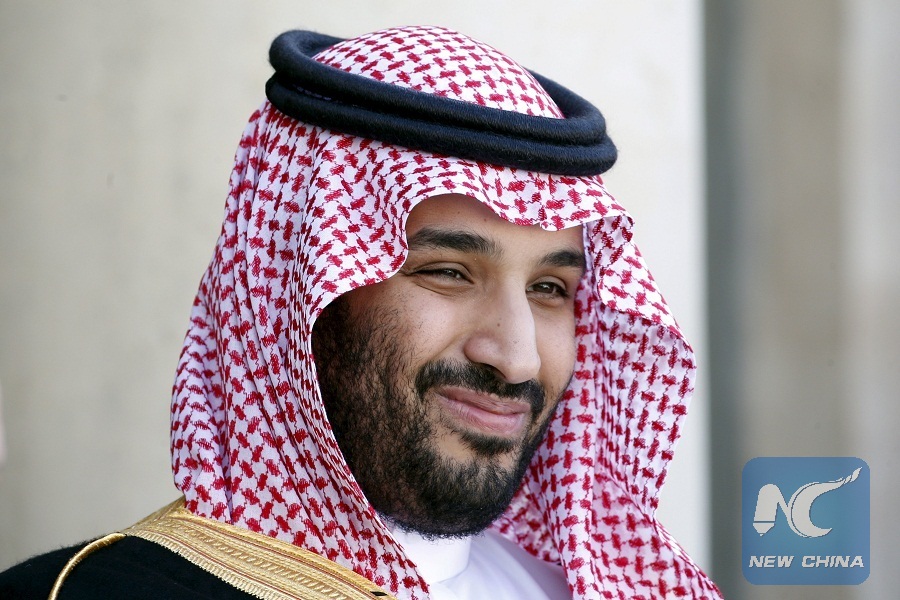
Saudi Arabia has achieved initial gains in implementing its Vision 2013, a grand plan targeting the post-oil age through drastic social and economic reforms. (Reuters Photo)
RIYADH, March 17 (Xinhua) -- Saudi Arabia has achieved initial gains in implementing its Vision 2030, a grand plan targeting the post-oil age through drastic social and economic reforms.
Supported by King Salman bin Abdulaziz Al Saud, the plan was rolled out by Saudi Crown Prince Mohammed bin Salman Al Saud in April 2016, aiming at seeking economic diversification to reduce the kingdom's traditional and nonproportional dependence on oil revenues.
The grand plan was introduced following an oil price plunge in mid-2014, which created unprecedented financial difficulties for the major oil producer in the world.
The sluggish oil market also exposed the vulnerability of Saudi's oil-dependent economy, prompting its rulers to think about seriously how to prepare the kingdom for the coming post-oil age.
REDUCED SUBSIDIES, NEW TAXES AND PRICE HIKES
As part of the efforts to implement the plan, the past two years have witnessed the hikes of local gasoline prices, electricity tariff and the activation of the value-added tax, while the government slashed subsidies for energy sectors.
The gasoline price has increased three times after two rounds of price hikes, with premium gas priced at 2.04 riyals (0.544 U.S. dollars) a liter, up from 0.90 riyals (0.24 dollars).
A five-percent tax was also imposed on most goods and services, including food, clothes, electronics and gas, as well as phone, water and electricity bills, and hotel reservations, since January 2018 to boost state revenues.
The savings from the new tariffs will be partly used to support a new citizen-account program to protect the low- and middle-income families from the impact of austerity measures.
It is viewed that the price hikes, mainly paid by the 10 million foreigners in Saudi Arabia, will increase government income by dozens of billions of dollars.
Meanwhile, Saudi Arabia is planning a 5-percent listing of the shares of its world's biggest energy firm Saudi Aramco. The listing, which is valued at approximately 100 billion dollars, would be the world's largest IPO.
The kingdom also lists tourism as one of the most important economic sectors, which was hard to imagine before.
The Saudi government has eased visa restrictions in order to attract tourists. Foreigners could obtain a Saudi tourist visa from the second quarter of 2018, in addition to the business visas and Hajj visas which are currently the only two types of visas that Saudi Arabia issues to foreigners.
The revenues of tourism are expected rise from 27.9 billion dollars in 2015 to an estimated of 46.6 billion dollars in 2020, the vision suggests.
MAJOR REFORMS LEAD TO SOCIAL CHANGES
Moreover, the Saudi government took some dramatic measures in the past two years to show its determination to return to a "moderate Islam" like before 1979, when Riyadh started implementing the most conservative version of Islamic rule in the Arab world, including the closure of cinemas.
In September 2017, the Saudi government announced that women will be allowed to drive from June 2018 onward, for the first time in the conservative kingdom since its foundation in 1932.
In October, the King Abdullah Sports City stadium in Jeddah welcomed women for the first time, who were seated in the designated family sections.
In December, Saudi Arabia announced a plan to grant licenses to open cinemas in early 2018.
The moves represented more than just significant steps in social reforms, as they are implemented also for economic reasons, including generating more income, creating new job opportunities, and boosting the development of some industries, including car manufacturing and sports.
The Saudi General Entertainment Authority, formed in May, 2016, presented over 2,200 foreign performances in 2017, attracting 8.2 million audiences from home and abroad.
The authority is determined to host over 5,000 performances in 2018.
In recent months, Saudi Arabia has organized concerts, a Comic-Con pop culture festival and a mixed-gender National Day celebration that saw people dancing on the streets to thumping electronic music for the first time.
Ahmed Al-Khatib, chairman of Saudi General Entertainment Authority, expected a 61 billion-dollar investment into the entertainment industry for the next decade, with an ambitious target to increase the annual entertainment spending of Saudis to 9.6 billion dollars in 2030.
The changes are intended to encourage Saudi citizens, who spend 20 billion dollars overseas, by travelling abroad to watch shows and visiting amusement parks in nearby tourist destinations, such as the city of Dubai, the United Arab Emirates (UAE).
WAR ON CORRUPTION GENERATES NEW FUNDS FOR REFORMS
Another major step taken by the conservative kingdom was a war on corruption launched since last November, when King Salman formed the Supreme Anti-Corruption Committee led by Crown Prince Mohammed.
During the crackdown on corruption, 381 individuals, with an estimated value of settlements standing at over 106 billion dollars, have been detained.
A total of 56 individuals remain in custody, as the Attorney General refuses to release them because of other pending criminal cases.
The government said the retrieved money would be used to fund economic projects.
Preliminary achievements of the Vision 2030 were revealed as Saudi Arabia released the report on the fiscal balance of 2017, which indicates a smaller deficit with a 34 percent growth of government income.
Saudi Minister of Finance Mohammed Al-Jadaan attributed the recent recovery of economy to a moderate resurge in the oil price and the economic reforms adopted so far.
Amid growing optimism about the country's process of economic diversification, the Saudi government announced its largest-ever budget for 2018, projecting its revenues at 208.8 billion dollars, with oil revenues taking up 63 percent.
King Salman said the government plans to balance the growth of budget by 2023, and curb the oil revenues to 50 percent.
Meanwhile, Saudi Arabia is also stepping into the manufacturing sector, by setting up joint ventures to produce automobiles and aircraft, despite being a late starter in the non-oil sectors.

